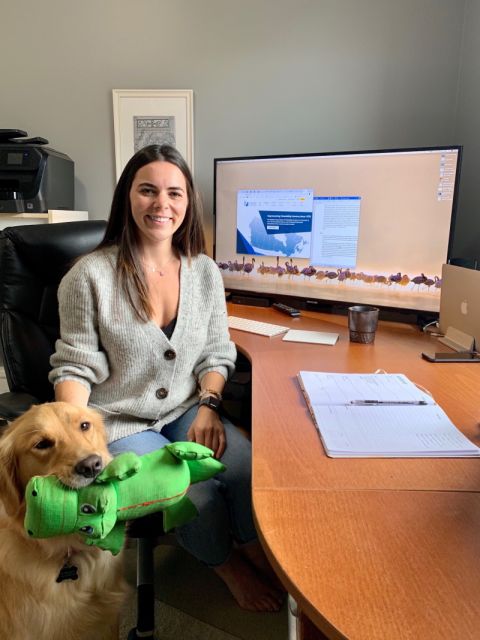
“As lawyers-in-training, we have a duty to contribute to reconciliation. That includes learning about Indigenous cultures, perspectives, and realities,” says Shira Crawley, Law’21. “It’s important for me to gain experience working with Indigenous people so that I can learn how to better support Indigenous communities and become an informed advocate.” With those goals in mind, she spent the summer interning with the National Association of Friendship Centres (NAFC).
The NAFC represents and supports over 100 Friendship Centres and Provincial/Territorial Associations from coast-to-coast-to-coast in achieving their diverse missions and visions within their urban Indigenous communities. From May till August, Crawley made two important types of contributions. “I provided information to give the NAFC the resources and knowledge to hold the Government of Canada accountable to its commitment to reconciliation with Indigenous people both on and off-reserve,” she says. “I also provided resources for Friendship Centres’ members to better inform them of the Canadian legal system, and to ultimately be their own advocates.”
When hearing her remote placement through the Debwewin Summer Law Program was with the NAFC, Crawley was delighted. “I knew I was going to gain experience working with national reports, such as the Truth and Reconciliation Commission report and the Murdered and Missing Indigenous Women and Girls report, as well as international documents like the United Nations Declaration on the Rights of Indigenous People,” she says. “I was excited to broaden my knowledge of Ontario’s statutes, and engage with other provincial and territorial legislation, as well as with federal legislation.”
That’s what she did over the summer, working on several assignments, including her main project to complete a literature review of 30-plus reports and their recommendations regarding Indigenous justice. The purpose of the review was to explore themes among the recommendations that had been emphasized and repeated multiple times in order to highlight those recommendations believed to have a greater and positive impact on the lives of Indigenous people within the Canadian justice system. “By bringing attention to the recurring recommendations advocated for repeatedly, action can be made focusing and prioritizing the recommendations that I discuss in my final memo,” she explains.
Crawley gained experience from two other work activities, as well. She drafted contract agreements, created public legal education resources for Indigenous people, and attended virtual summits and conferences. “I learnt a lot about Indigenous culture, heritage, perspectives, and the current realities facing Indigenous people,” she says. “I also got to hear from and speak with renowned Indigenous scholars, experts, and activists, like Jade Tootoosie, Marion Buller, Senator Yvonne Boyer, and Cindy Blackstock, to name a few.”
Through her internship, Crawley further developed her research skills. “I learnt how to work effectively and efficiently, reviewing dozens of documents, each at least 100 – sometimes thousands – pages long,” she says. “I also learnt how to ensure that all of my research notes are comprehensive, so that the work I did could be used even after my internship ended.”
She also developed her writing skills to be more effective and direct. To write contracts, she researched precedents and determined what information must be included and what information is irrelevant. Another aspect was to write content to “present information in both technical and in more layman’s terms, so that the information can be understood and impactful when read by the general public.”
Also important to Crawley was the opportunity to learn how to be an effective advocate. In her words, that means “listening to and understanding my client in order to provide meaningful support, as well as being informed, calm, and confident in order to successfully persuade opponents.
“This opportunity has taught me to be humble and to always listen,” she continues. “It has also increased my knowledge and respect for Indigenous people. I am extremely grateful because I would have never been able to learn as much as I have in a classroom.”
It’s her first-year classes that piqued her interest in Aboriginal Law. “I enjoyed reading the Aboriginal law cases in Property, Constitutional, and Criminal classes, however, I felt there was a gap in the information being taught,” she explains. “I was always left with questions regarding the Indigenous perspective towards the cases and decisions that were made.”
Combine her inquiring mind with her long-time passion for public service and it’s easy to see why Crawley was drawn to a Debwewin Summer Law Program internship. Through the program, Queen’s Law and the Ontario Ministry of the Attorney General’s Indigenous Justice Division provided her and two classmates with financial support so they could provide community education and legal assistance support to Indigenous communities and community organizations in the province.
Crawley now encourages fellow students to pursue internships next summer. “Internships are an amazing opportunity to explore areas of law that you are interested in while also gaining meaningful experience,” she says. “They also give you the opportunity to provide support to organizations that provide real services and help for under-funded, over-looked, marginalized groups. You’d be amazed at the altruistic, supportive, and successful people who work within, for, and in association with these organizations. You develop friendships and connections that will help you wherever you may go.”
Because internships are often completed with public bodies, not-for-profits, charities or non-governmental organizations, she says “the experience can and usually is extremely fulfilling. It gives you perspectives you would not have had otherwise, that can be brought into every class, every interview, and every discussion – whether with friends, family, peers, colleagues, or even clients.”